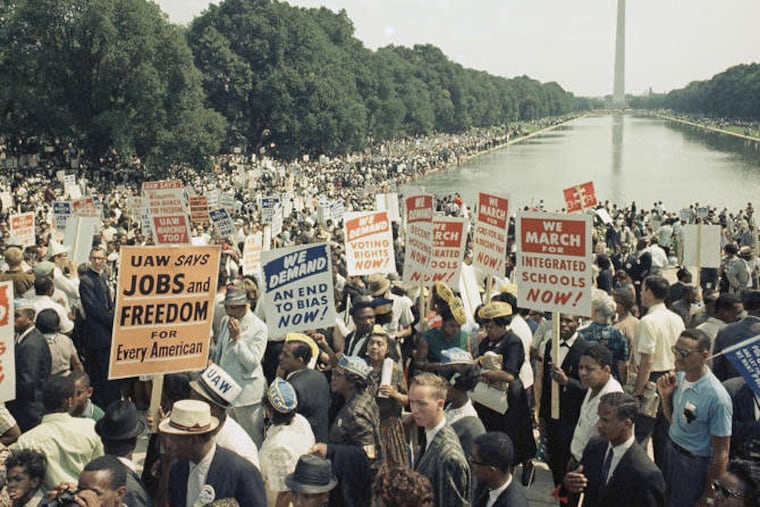50 years later, gauging impact of March on Washington
Aug. 28 will mark the 50th anniversary of the March on Washington, an ideal time to reflect on what that day meant for the civil rights movement and for the country.

Jobs, Freedom, and the Forgotten History of Civil Rights
By William P. Jones
W.W. Norton. 288 pp. $26.95
nolead ends nolead begins
Reviewed by Paul Jablow
Aug. 28 will mark the 50th anniversary of the March on Washington, an ideal time to reflect on what that day meant for the civil rights movement and for the country.
A commemorative ceremony is planned for Aug. 24, with a march from the Lincoln Memorial to the nearby memorial for the Rev. Dr. Martin Luther King Jr., whose "I have a dream" speech is the most vividly recalled part of that historic event a half century ago.
"It is the intent of those who come together," said the Rev. Al Sharpton, "to make it clear that this is not just a nostalgia visit . . . but a continuation and a call to action."
William P. Jones' book is a useful contribution to the commemorative effort, just not as useful as it might have been. "The very power of that speech," writes Jones, a professor of history at the University of Wisconsin, "has obscured the actual significance of the march and, by extension, the larger civil rights movement."
A better assessment of the significance of the march, however, would have meant talking about it with some of the dwindling number of participants still alive. This Jones does not do. The book, well-researched as it is, unfortunately stops in the mid-1960s.
As Jones says, the march involved much more than King's speech. Preparations for the event - actually called "The March on Washington for Jobs and Freedom" - involved a complex interplay of competing forces: Demonstrating vs. working within the system, militancy vs. accommodation, desegregation vs. overall working-class economic progress.
The desegregation/economic-progress issue is where the book is particularly strong; the author notes that while different leaders placed emphasis on one or the other, they are intertwined. He also stresses the bond between the civil rights movement and the labor movement, a bond stressed at times but never broken.
The 10 speakers included civil rights leaders A. Philip Randolph, the country's most prominent black trade union official and titular head of the march; John Lewis; Whitney Young; and United Auto Workers president Walter Reuther. They were followed by a spiritual sung by Mahalia Jackson - "I've been 'buked and I've been scorned." King came on stage shortly before 4 p.m. to address a hot and exhausted crowd of some 250,000 people who had come by bus, by train, even on foot from around the country.
The "I have a dream" passage of his speech - actually used two years earlier in remarks King gave at the AFL-CIO convention - came only after he had tossed away his prepared notes. And as Jones points out, while the speech is "justifiably remembered as the most powerful and effective address" of the event, "it was the least representative or attentive to the specific goals and demands of the mobilization."
Jones traces the roots of the march to one that didn't occur, contemplated by Randolph and other civil rights leaders in 1941 to force President Franklin D. Roosevelt to ban discrimination in defense industries in the buildup preceding World War II. Roosevelt, panicked at the thought of a march, agreed through intermediaries to measures including a Fair Employment Practices Commission (FEPC).
The FEPC, however, proved toothless, as Roosevelt was more concerned with placating Southern segregationists in Congress than blacks, many of whom were denied the right to vote. Resentment over Roosevelt's unwillingness to integrate the armed forces and support strong civil rights legislation rankled black leaders for years, so when President John F. Kennedy tried to discourage the march on Washington in 1963, he got little sympathy from Randolph, Bayard Rustin and others.
Kennedy was less upset about the prospect of the march than Roosevelt, and met with King and other leaders immediately afterward. But less than three months later, Kennedy was dead, and less than a year later, a far stronger civil rights bill than he had been willing to support was signed into law by his successor, Lyndon B. Johnson. The Voting Rights Act of 1965 came soon afterward.
How much of this progress was due to the march, how much to Kennedy's memory, and how much to Johnson's personal commitment is, of course, impossible to determine, and Jones doesn't try.
But the controversy over the recent 5-4 decision by the U.S. Supreme Court that the need for much of the Voting Rights Act has passed is evidence that the issues raised by the march remain very much alive.